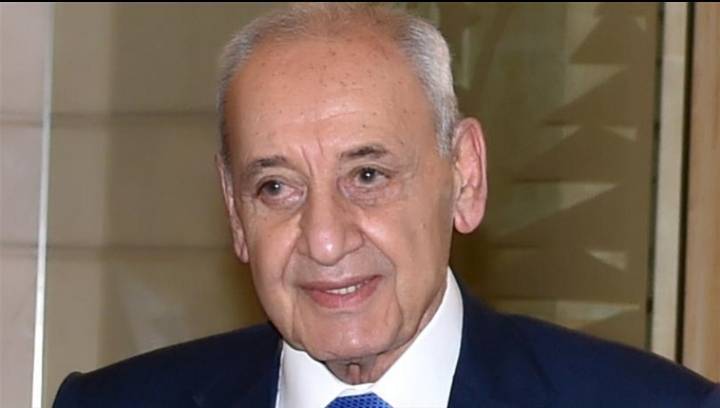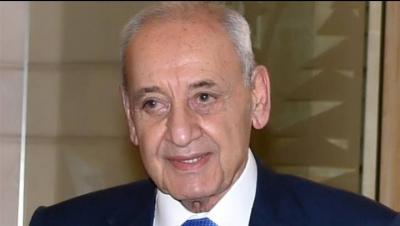The Lebanese Parliament is days away from becoming a battleground that extends beyond the session to elect the President of the Republic scheduled for tomorrow (Thursday), which is expected to conclude similarly to previous sessions, focusing on resolving the dispute over calling for sessions to legislate urgent matters and determining the quorum for the second round of presidential voting. Speaker of Parliament Nabih Berri insists on weekly calls for the election. According to parliamentary sources, Berri is keen to hold sessions for urgent legislation and ties the scheduling of these sessions to the completion of discussions by joint parliamentary committees on agenda items, primarily those related to capital control, restructuring banks, and the financial recovery plan, considering these necessary for approval in response to the International Monetary Fund's request.
In contrast, Christian parliamentary blocs reject the call for special sessions for urgent legislation, a view shared by several lawmakers from the "Change Forces" bloc and other independents, arguing that the priority should be limited to electing the president first. A parliamentary source clarifies to "Asharq Al-Awsat" that there is no conflict between repeated calls for electing the president and holding sessions for urgent legislation. The question arises: can parliamentary legislation be paralyzed if the presidential vacancy persists? And how will we respond to the international community's questions regarding the impossibility of achieving the required reforms listed by the IMF to help Lebanon overcome its crises?
The parliamentary source disagrees with the view that urgent legislation delays the presidential election, which fundamentally stems from the deepening rift among Christian parliamentary blocs that obstructs the election process. Some segments of the opposing Christian street insist on holding responsible those who boycott the second round of presidential voting, instead casting white ballots in the first round, which benefits Hezbollah, which conditions agreement on a president before proceeding with the election.
It seems that the dispute over urgent legislation will prominently accompany future sessions dedicated to electing the president, similar to the contention over calculating the quorum for the second election session. However, the political scene that has surrounded previous sessions for electing the president will not overshadow the disagreement over the interpretation of Article 49 of the Constitution. This article stipulates that the president be elected in the first round with a two-thirds majority from the total number of parliament members, namely 86 votes out of a total of 128 deputies, and that the election occurs by the same majority.
For the second round of presidential voting, Article 49 specifies that the president be elected by an absolute majority of half the number of deputies plus one (65 deputies), without stipulating the legal quorum needed for its session to convene. This has started to create issues among most opposition parties (except for "the Democratic Gathering") and some deputies from the "Change Forces," as well as independents who insist that the session requires a presence of an absolute majority, in contrast to Berri, who argues that it requires a two-thirds presence of parliament members.
Berri defends his position by stating that previous presidents have always been elected in the second round by an absolute majority, provided that the two-thirds quorum is met. He adds that this requirement serves to protect the Maronite position as the highest in the state, namely the presidency, to prevent the Muslim vote from overwhelming it.
In this context, a parliamentary source questions what the Christian references will respond to if deputies from Islamic sects, along with several Christian deputies elected in districts dominated by the Muslim vote, unite in the second voting round and support a Christian candidate against their will, ensuring victory by obtaining the absolute majority. Will it mean they will win with the support of this majority, i.e., half of the attendees plus one? And would they accept this outcome if the attendance were limited to a few Christian deputies plus 65 Muslim deputies making up the majority required for the session to convene?
The source affirms that Speaker Berri will maintain his position and will not yield to populist pressures, ensuring the top Maronite position in the state and ensuring parliamentary immunity for it. It is revealed that the late Maronite Patriarch Nasrallah Sfeir had firmly established Bkirki's position by stating: "A session to elect the president in both rounds is not valid without completing the two-thirds quorum." This point was echoed by MP Samy Gemayel, who called for Christians to gather in a Kataeb meeting in 2007 to participate in the presidential election session, emphasizing not to undermine the two-thirds quorum in both rounds of voting.
Therefore, as the parliamentary source states, what has been written regarding the two rounds of presidential elections cannot be returned on to ensure effective Christian participation in the election away from populist pressures associated with the atmosphere that led to the disruption of election sessions, which will be evident in Thursday's session. The insistence on the two-thirds quorum acts as a barrier to prevent any faction from exploiting changes in the balance of power in Parliament, and consequently, the dispute over the quorum will not become an explosive issue in the absence of any stance from Bkirki or the Council of Catholic Patriarchs supporting the opposition forces' request for the second voting round to convene with an absolute majority present.




